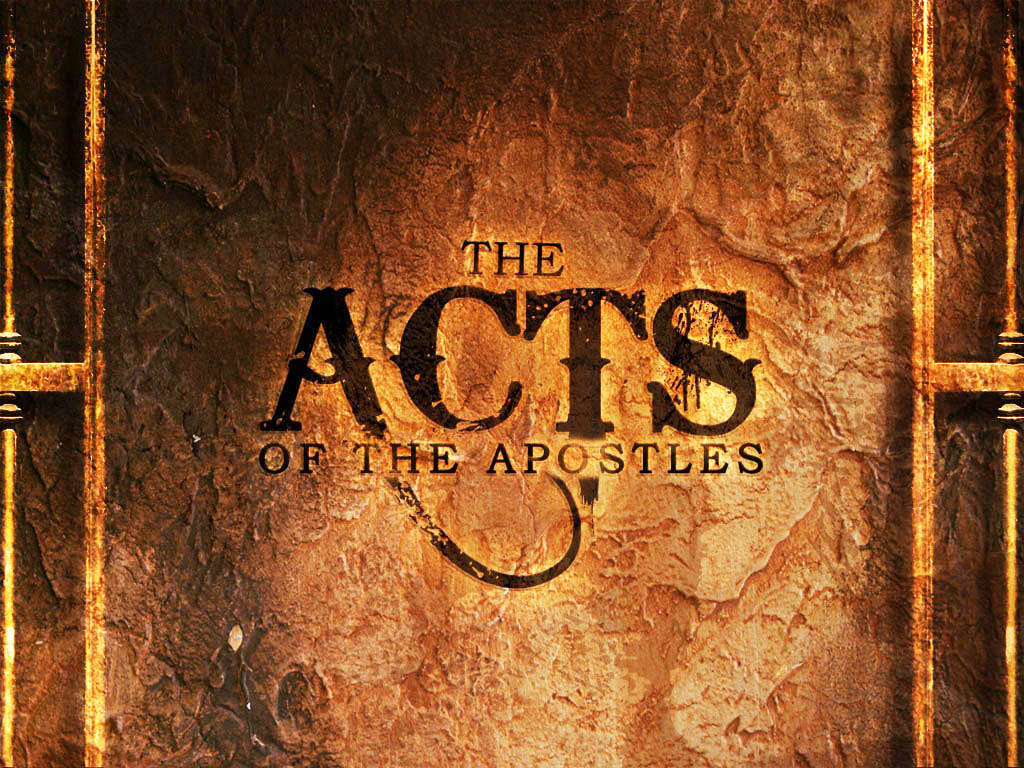 Now when they saw the boldness of Peter and John, and perceived that they were uneducated, common men, they were astonished. And they recognized that they had been with Jesus. (Acts 4:13). Peter and John had not been formally trained in religion, or public speaking, for that matter. They were unschooled ordinary men. And, it’s interesting to know that at this point the religious leaders realized that these men had traveled around with Jesus. Over the course of three years, the Son of God had taught the former fishermen everything they knew. You can receive extensive, formal, theological education and have degrees after your name. But if you’ve never “been with Jesus” in a spiritual relationship and enrolled in his school of discipleship, you’ll make no lasting spiritual impact on others. (Evans, T. (2019). The Tony Evans Study Bible (p. 1275). Nashville, TN: Holman Bible.) Do others around you recognize when you have been spending time with Jesus? In John 15:20, Jesus told his disciples, “If they persecuted me, they will also persecute you." That persecution was about to begin. Here, in Acts 4, the religious leaders seized Peter and John and threw them in jail until the next day since the Jewish council, the Sanhedrin, didn’t meet at night. Nevertheless, beginning with the healing of one lame man (Acts 3:1–10), God brought about five thousand men to Christ. There’s no stopping the kingdom of God manifested through the power of the Holy Spirit when Jesus is being glorified. And, it was evident that these men had been with Jesus and they were speaking with much authority in the Holy Spirit. In his sermon at Pentecost, Peter proved from the Scriptures that Jesus was alive; but now he proved it by the miraculous change in the beggar’s life. The man was healed through the power of the name of Jesus. The Sadducees did not believe in the Resurrection, so they wanted to put a stop to the ministry of the apostles. They were threatened by the growing number of Jesus followers. This was the beginning of the official persecution of Christians. What do you do when they tell you to stop sharing the gospel? What did the apostles do? Certainly they recalled the words of Jesus Christ (Matt. 10:16–26) and depended on the Holy Spirit to help them. Furthermore, they were so filled with their message and with love for Christ that they could not stop telling people about Him, and they did it with boldness! How did they do this? They depended on prayer and directed their prayer to a sovereign God who made everything and can do anything. They based their petitions on Psalm 2, a good psalm to read when you are being attacked. What would it mean to be this bold in your faith in the following situations: at school? at work? at a party? at home? When do you find it hardest to be bold about your faith? Why is it sometimes hard to be bold? What keeps us from being bolder? Are you spending time with Jesus in prayer? How could a shy person be bold in his or her faith? Is it ever possible to be too bold about your beliefs? Are you praying about opportunities to boldly proclaim the Gospel?
0 Comments
 What is God’s Will for you and me during difficult and troubled times and circumstance like these? Rejoice! Rejoice in peace! And giving thanks by rejoicing some more in the Lord. “Rejoice in the Lord!” is used in Psalm 32:11, 35:9, 64:10, 97:12, 104:34; Isaiah 29:10, 41:16; Joel 2:23; Habakkuk 3:18; Zechariah 10:7; Philippians 3:1, 4:4; in the scriptures in this post, and many more. Even in the difficulty and imprisonment the Apostle Paul faced throughout scripture, his example and his message to the church... to us... was and is “Rejoice… Count it all joy.” “Yes, and I will rejoice, 19 for I know that through your prayers and the help of the Spirit of Jesus Christ this will turn out for my deliverance, 20 as it is my eager expectation and hope that I will not be at all ashamed, but that with full courage now as always Christ will be honored in my body, whether by life or by death. 21 For to me to live is Christ, and to die is gain. (Philippians 1:18–21 ESV) But how do we rejoice like Paul? Pray! In all things Pray! Pray without ceasing! Trust Christ! Think of Jesus! Do we think of Jesus, His grace, mercy, sacrifice, suffering, death for us, resurrection, hope, and return, when we face difficulties? Is He our first thought, or is it, “How do I escape this?” As difficult, and seemingly impossible as it often is, we are commanded to rejoice. Rejoicing in trials, seems counterintuitive, even strange. It’s definitely counter-cultural; but, it’s a command. Looks at 1 Thessalonians 5:16–22 (ESV): “Rejoice always, 17 pray without ceasing, 18 give thanks in all circumstances; for this is the will of God in Christ Jesus for you. 19 Do not quench the Spirit. 20 Do not despise prophecies, 21 but test everything; hold fast what is good. 22 Abstain from every form of evil.” In the Greek, 5:16 (not John 11:35) is the Bible’s shortest verse. It is often, however, one of the hardest to obey or keep. So, how do we train our attitudes to supersede the deep seeded pain, struggle, past, and even present circumstance we find ourselves in? First, know that we have to be intentional in our training by setting up frequent reminders to pray! In our prayers, we should pray prayers of thanksgiving as much as for supplication (our needs and requests). We need visual reminders in our day to be thankful and to rejoice by seeing God’s grace, mercy, promise, and amazing actions where the Gospel is moving forth, in our lives and the lives of others, and think on these things. This can be a watch or bracelet like I wear that says, "TETELESTAI," which means "It is finished!" Secondly, Serving others is another great way to develop in rejoicing in difficult times. It removes the focus from our circumstances to others. Who can we serve? How can we serve or bless them? This action often helps to control our pride. The best cure for pride is not humility (which can lead to false piety) but thankfulness (5:18; see Rom. 1:18–32). As someone has suggested: — Be careful for nothing. — Be prayerful in everything. — Be thankful for anything. Finally, we must lean into the Holy Spirit’s leading by faith, trusting the path for which He is leading. Remember, He sees what you can’t and loves you more than you or anyone can. There are two common ways that believers can fail in their relationship with the Holy Spirit: First, by “stifling” Him which involves not doing what He wants us to do. And secondly, by “bringing sorrow” to Him (see Eph. 4:30), which means doing what He does not want us to do. The local church fellowship (believer/followers) should reflect God’s joy and peace even in troubled circumstances; and it/we will if God’s people obey authority, minister to one another, and submit to the Spirit of God, and in all things and time. Let us REJOICE in the Lord!  At the Temple Gate, Peter and John encounter a beggar who had been disabled since birth. The beggar ask for money, but gets healed instead. The man’s healing causes quite a stir among the people in the temple courts, and Peter seizes the opportunity to speak to the crowd about the Gospel of Jesus Christ. This is the first miracle following the inauguration of the Christian community and it testifies to the authority of Jesus’ word through His apostles While the Holy Spirit is not named in this chapter, He was certainly at work in and through the Apostles, performing His ministry of glorifying Jesus Christ. In Acts 1, the Apostles were waiting for the Holy Spirit. In Acts 2, the Apostles and 109 others experienced the coming of the Holy Spirit in tongues like fire and equipping each person to speak to a gathered crowd in their own dialect. God received the Glory. Here, the same Spirit that raised Jesus from the dead has empowered the Apostles to do great works in the power of Jesus Name. Now that they were filled with the Holy Spirit, the Apostles were no longer competing for greatness, but were at last working faithfully together to build the church and Glorify the Savior. In chapter 3, we see new Priorities. Peter and John were not so caught up with large crowds that they had no time for individuals… Nor were they so busy in ministry that they could not pray… They had learned their lessons well from the Lord Jesus (Mark 1:35; Luke 8:40). In acknowledging this disabled beggar, the Holy Spirit led Peter and John to see beyond the financial need, an empowered them to see the beggar's spiritual bankruptcy. The Holy Spirit led Peter and John to restore his physical and spiritual issues. The beggar leaped. I call him the Bouncing Beggar. In this chapter, we see a new Power. The emphasis in chapters 3–4 is on the name of Jesus, the name above every name (Phil. 2:9–11). Phil. 2:9–11 Therefore God has highly exalted him and bestowed on him the name that is above every name, 10 so that at the name of Jesus every knee should bow, in heaven and on earth and under the earth, 11 and every tongue confess that Jesus Christ is Lord, to the glory of God the Father. Peter is careful to portray this miracle as the work of Jesus; in doing so, he expresses Jesus’ nature, character, and power by praying, "In Jesus Name.' Luke, who is a physician, observes the specific way Jesus’ power works instantly to overcome the man’s lifelong disability. There is power in the name of Jesus. Faith in the name of Jesus releases power so that lives are changed… To pray or minister in His name means to ask or act on His authority (Matt. 28:18–20) so that He alone gets the glory. We also see a new Proclamation by Peter and John. At Pentecost, the sound of a rushing wind drew the crowd; but here the witness of a changed life brought the people together… Thus, Peter had the opportunity to preach, and two thousand people were converted… This tells us that we are to reach out to individuals and God will give us opportunities for a bigger harvest.  In Acts 2, the Spirit came, not because the believers prayed, but because the day of Pentecost had come, the day appointed for the “birthday of the church” (Lev. 23:15–21). The Holy Spirit baptized the believers into one body (1 Cor. 12:13) so that they had a living connection with their Head exalted in heaven. Luke 2 describes the birth of the Lord’s physical body and Acts 2 the birth of His spiritual body. Tongues as of Fire… like a blaze substance divided and distributed itself into one stream per individual, coming to rest on each person. The fire, much like the Pillar of Fire, the Burning Bush, and on the Ark of the Covenant, represents God’s Presence. These 120 believers, heard a mighty sound, saw tongues of Fire, and began to speak in other languages… other dialects (Greek: Other “heteros” tongues/languages “dialektos”). This experience clarified the Tower of Babel experience in Genesis 11. “Speaking in tongues” has a long history in Pagan Worship. Various sects practiced a form of “ecstatic utterances,” or Babel with frenzied emotional expression in their worship. However, these believers spoke in different dialects where everyone present could understand in their own language. This was not some “Heavenly Language” or salvation determinant. And, onlookers regarded this supernatural event as unique, and as a miraculous gift of God, for a specific ministry… to communicate the Gospel. The Holy Spirit also filled the believers and empowered them for witness, to amaze and astonish for the Glory of God. He gave Peter insight into the Word and the ability to show men Christ in the Word. The Spirit used the witness of the church to convict the lost, just as Jesus said He would do in Luke 16. But, the same Holy Spirit assisted the believers in their church fellowship (vv. 40–47). The original group was outnumbered by the new believers, but there was still harmony in the church family. The church grew from 120 to 3,120 in one day. They worshiped daily and witnessed daily, and “the Lord added to the church daily” (v. 47). Is your experience with the Lord a daily one? The ministry of the Holy Spirit has three major purposes: 1.Convict the world concerning Sin, Righteousness, and Judgement. (John 16:11) 2.Continue Christ’s Earthly Ministry: Teaching and reminding us of Truth; Guiding, Encouraging, Calling and Sending into ministry; and Interceding with Jesus. (John 16; Acts 13) 3.Gifts the Members of the Body of Christ with Spiritual Abilities and Manifests the Character of Christ (Fruit of the Spirit) in and through them. (Eph. 4; Gal. 5) Two Truths that Emerge from Acts 2: 1.When God is at work, no one can duplicate it or ignore it. (This was miraculous) 2.When the Spirit gives power, God receives credit, not people. (This was Supernatural) People could literally talk and understand/communicate in their own dialects/language… Bringing Glory to God and with the ability to share Jesus with all those present.  Following are notes from a Connect Group with students from Acts 1:1-14. I feel these points are extremely relevant for our culture and world as we are experiencing unprecedented times with the Corona Virus. Fear and anxiety are at an all time high. Our world needs to know there was much fear, confusion and turmoil in the beginning days of the church, but God remained faithful and true to His Promises. He is Sovereign, All-Powerful, and He is totally in control. You can trust Him, even in this Storm. Take a look at the first 14 verses of the Book of Acts. -One hundred and twenty ordinary people hardly constitute an army; but in a few days, they would make an impact that is being felt even today. The same resources God gave them are still available to us. -Christ is the Head of the church and supplies life to His body, giving direction to His people. What He began to do and teach, the church continues as He guides and empowers through His Spirit. -God’s power is available to God’s people who want to do His will and be His witnesses. You do not have to be an apostle to have the power of the Spirit in your life. -He is the Lord of history, working out His purposes in this world. -God shares His power with us as we pray and ask Him for His help. -His Word is still our lamp and light (Ps. 119:105), and we must obey what it says. God guides His people when they are willing to follow. If we are faithful to read God’s Word, study it, meditate on it, and obey it, God will guide us when we have decisions to make. The Holy Spirit teaches us (John 14:26; 16:13–14) and directs us when we pray and seek the Lord’s will. The Holy Spirit uses truth, not ignorance; so the more facts we have, the better. We should use our common sense but not lean on it (Prov. 3:5–6), for we walk by faith and not by sight. If we sincerely move in the wrong direction, the Lord will show us (Acts 16:6–10; Phil. 3:15), so we need not fear. It is good for believers to read the Word and pray together as they seek the mind of the Lord. In the beginning God created the heavens and the earth. Now the earth was formless and empty, darkness was over the surface of the deep, and the Spirit of God was hovering over the waters. And God said.… And it was so. God saw all that he had made, and it was very good. (Genesis 1:1–3, 30–31)
When God created the world, he was pleased with what he made. It was good. He created something out of nothing, which is hard for us to understand. God needs nothing and is truly self-sufficient. Yet he made the earth and everything in it, demonstrating his power and creativity. He was particularly excited about the first people he made, Adam and Eve. “God said, ‘Let us make mankind in our image, in our likeness, so that they may rule over the fish in the sea and the birds in the sky, over the livestock and all the wild animals, and over all the creatures that move along the ground.’ So God created mankind in his own image, in the image of God he created them; male and female he created them. God blessed them.” (Genesis 1:26–28). God created Adam and Eve differently than all the other creatures. He created them in his own image. What do you think it means to be created in God’s image? Imagine what it was like to be Adam and Eve! No insecurities, achy muscles, or tired brains to slow them down. And God gave them the coolest jobs: naming the animals, exploring the garden, and enjoying his creation with him. Obeying God was good for Adam and Eve. They were perfect and fulfilled. They weren’t lonely or insecure. Every need was met. They lived with purpose in the best relationship with God and with each other. God clearly told them the consequence of disobedience: “You must not eat from the tree of the knowledge of good and evil, for when you eat from it you will certainly die” (Genesis 2:17). Choosing God is choosing life! Taylor, S. (2017). Brand New: A 40-Day Guide to Life in Christ (pp. 16–17). Bellingham, WA: Lexham Press. Pic from Wakefield Bible Church... Pastor Mark.  How can a young man keep his way pure? By guarding it according to your word. With my whole heart I seek you; let me not wander from your commandments! I have stored up your word in my heart, that I might not sin against you. Blessed are you, O Lord; teach me your statutes! With my lips I declare all the rules of your mouth. In the way of your testimonies I delight as much as in all riches. I will meditate on your precepts and fix my eyes on your ways. I will delight in your statutes; I will not forget your word. (Ps 119:9–16). The Bible is the word of God. We can trust it! It was true when it was written, it is true today, and it will be true forever. The Bible is the standard for Christian faith and action. When we aren’t sure if a belief or action is true, we should look at what God says in Scripture. God never contradicts himself. “The word of God is alive and active. Sharper than any double-edged sword, it penetrates even to dividing soul and spirit, joints and marrow; it judges the thoughts and attitudes of the heart” (Hebrews 4:12). Christians need to know the Bible, to study and memorize it. Psalm 119 calls the Bible a lamp for our feet and a light for our path. In showing us who to follow, it guides who we are and what we do. It builds up. It corrects us. It trains us in the way we should go. God’s word is powerful. It’s not empty, but instead it accomplishes what God desires. The Bible teaches the history of God’s people and the history of the King and Savior, Jesus Christ. This history is for all believers, even for us today. The Bible shows us who God is and what he has done, still does, and will do. It also shows us who we are and how we should live. Because Christ has already won the victory over sin, death, and the devil, we know that this victory will be ours! All Scripture is God-breathed and is useful for teaching, rebuking, correcting and training in righteousness, so that the servant of God may be thoroughly equipped for every good work. (2 Timothy 3:16–17) Is God's Word a light unto your path? What verse or verses have had the most impact on your life? What verse do you struggle most with putting into practice? Taylor, S. (2017). Brand New: A 40-Day Guide to Life in Christ (pp. 12–13). Bellingham, WA: Lexham Press. Recently, we began an exciting new journey through Scripture with the students of Marshall Baptist Youth about what it means to be a follower of Christ… what it mean to be a DISCIPLE.
We started by looking at the call of the first disciples to simply follow Jesus by faith on a lifelong, relational journey. Now, these teachings seem quite elementary for those who have attended church most of their lives; however, we read how Jesus spoke to His followers and gave them quite a challenge. Jesus told His Disciples (us) to “take up your cross daily and follow me” and unpacked the concept that discipleship isn’t an option—discipleship is for every believer, not just the “super religious.” As Christians, our lives should be marked by a total surrender to God’s plan for our lives, not just our own personal desires for which we aspire and exhaust much energy. Dr. Luke pens the words of Jesus, “If anyone would come after me, let him deny himself and take up his cross daily and follow me. For whoever would save his life will lose it, but whoever loses his life for my sake will save it. For what does it profit a man if he gains the whole world and loses or forfeits himself? For whoever is ashamed of me and of my words, of him will the Son of Man be ashamed when he comes in his glory and the glory of the Father and of the holy angels. But I tell you truly, there are some standing here who will not taste death until they see the kingdom of God.” (Luke 9:23–27) Matthew puts it this way, “And whoever does not take his cross and follow me is not worthy of me. Whoever finds his life will lose it, and whoever loses his life for my sake will find it.” (Matthew 10:38–39) We were and should all be challenged by the passages that remind us that we live in an upside-down Kingdom and that we must lose our lives to find them. Throughout November, as you process those things for which you are thankful, think also about what God has called you to—think also about what it means to be a true DISCIPLE by asking some tough questions:
Many blessings and much love as you chase after and embrace Jesus. From MBC Newsletter; Inspired by The Life; YM360, and Andy Blanks... So you are no longer a slave, but a son, and if a son, then an heir through God. (Gal 4:7)
"Have you ever said, “It’s my life. I’m free to do whatever makes me happy”? After a while, whatever you choose to pursue--popularity, alcohol, relationships, living selfishly, or trying hard to be perfect--becomes something that controls you instead of you controlling it. Soon the choice doesn’t feel like a choice at all. Instead of being free, you’re a slave. Before we commit our lives to Jesus we are slaves to sin. Even if we try to be good, we still aren’t free. Freedom is an illusion. We are tangled up in our sin, and it is impossible to set ourselves free. When we commit our lives to Jesus, we are freed from our slavery. Only God brings real freedom. He frees us from everything we’ve been controlled by. Only God—who is absolutely perfect and all-powerful—can make us his children and save us. Jesus forgives us. Jesus heals us. Jesus makes us whole. Don’t be discouraged if you don’t see instant change. The more you know God, the more you will become the person God created you to be. He knows what your purpose is, what is best for you, what you are good at, and how your experiences will be used in the future. He will help you get past what holds you back. He will make you whole." (Taylor, S) So Jesus said to the Jews who had believed him, “If you abide in my word, you are truly my disciples, and you will know the truth, and the truth will set you free.” They answered him, “We are offspring of Abraham and have never been enslaved to anyone. How is it that you say, ‘You will become free’?” Jesus answered them, “Truly, truly, I say to you, everyone who practices sin is a slave to sin. 35 The slave does not remain in the house forever; the son remains forever. So if the Son sets you free, you will be free indeed. (Jn 8:31–36). What are some things you have been a “slave” to? Describe what you think it means to be a “slave to sin.” What will the truth do? How does it feel to know that you are God’s child whom he has set free? Taylor, S. (2017). Brand New: A 40-Day Guide to Life in Christ (pp. 10–11). Bellingham, WA: Lexham Press. And I will give you a new heart, and a new spirit I will put within you. And I will remove the heart of stone from your flesh and give you a heart of flesh. And I will put my Spirit within you, and cause you to walk in my statutes and be careful to obey my rules. (Eze 36:26–27).
...If you confess with your mouth that Jesus is Lord and believe in your heart that God raised him from the dead, you will be saved. For with the heart one believes and is justified, and with the mouth one confesses and is saved. (Ro 10:9–10). If you believe Jesus died and rose again to forgive you and to give you true life, if you have asked him to forgive you, if you have asked him to be the Lord and Leader of your life, then celebrate! You have begun an incredible journey with the Lord of the universe... the Master Designer of all that exists. No longer do you have to worry about whether you’re good enough for God or anyone else, because in Christ you are God’s own child! You matter... You are important... You are loved! Nothing can separate you from the love of God in Christ Jesus. When you feel alone or when you experience guilt and shame, you can turn to God instead of running away from him. You are forgiven! A relationship with God is bigger and better than any other relationship or anything you can buy or possess. It’s permanent and it will change you more than anything else in your life. It's a lifelong journey of adventure. For God so loved the world, that he gave his only Son, that whoever believes in him should not perish but have eternal life. For God did not send his Son into the world to condemn the world, but in order that the world might be saved through him. Whoever believes in him is not condemned, but whoever does not believe is condemned already, because he has not believed in the name of the only Son of God. And this is the judgment: the light has come into the world, and people loved the darkness rather than the light because their works were evil. For everyone who does wicked things hates the light and does not come to the light, lest his works should be exposed. But whoever does what is true comes to the light, so that it may be clearly seen that his works have been carried out in God.” (Jn 3:16–21). What are you excited about in your adventurous journey with God? What scares you about your journey with God? Why did Jesus come to earth? How do Jesus’ words in this passage comfort you? Taylor, S. (2017). Brand New: A 40-Day Guide to Life in Christ (p. 7). Bellingham, WA: Lexham Press. |
Pastor Shan SmithJesus follower, Husband, Father, Student Ministries Pastor at Marshall Baptist Church Archives
May 2020
Categories |





 RSS Feed
RSS Feed